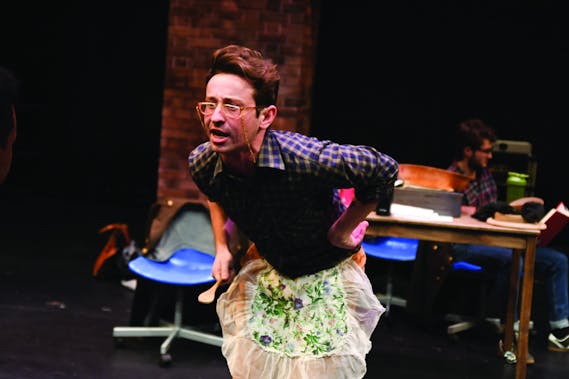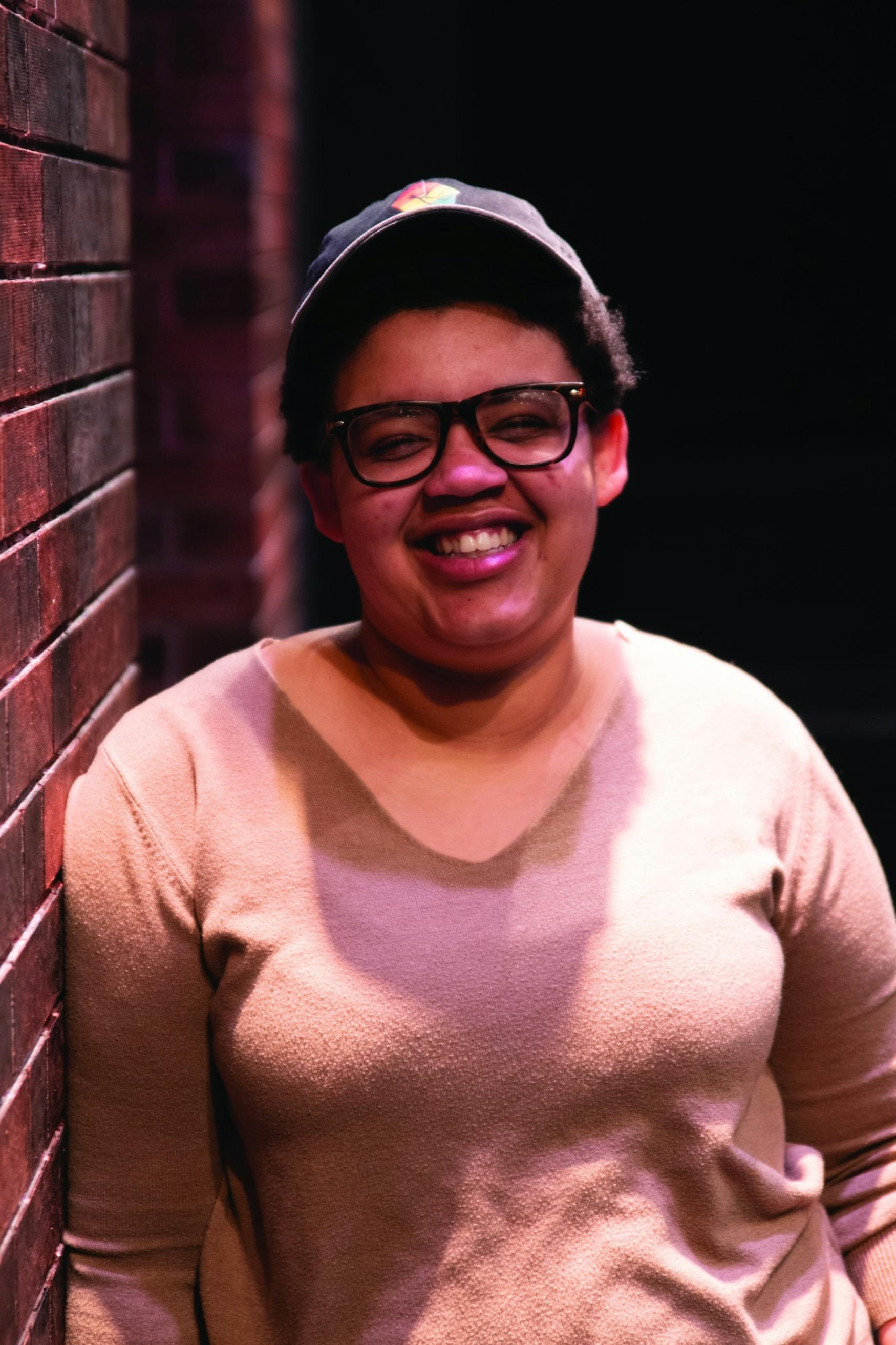What we talk about when we talk about history: A conversation with Pascale Florestal
This week, justArts&Culture spoke with Pascale Florestal, the director of “We Are Proud to Present a Presentation about the Herero of Namibia, Formerly Known as Southwest Africa, From the German Sudwestafrika, Between the Years 1884-1915.” The show tells the story of a group of six students trying to tell the story of the Herero and Namaqua genocide, which happened between 1904 and 1908 under the occupation of the German Empire. During the interview, Florestal talked about her relationship with this production, the historical meaning behind the script, the challenge of discussing such a sensitive topic through theater and what it was like to work with college students the past month and half.
JustArts&Culture: Tell me a bit about yourself and how you got involved with this project.
Pascale Florestal: I am a director, educator and arts administrator in the city. I moved here about five, six years ago and I’ve been directing and teaching theater in Boston for the last five years. I started working at the Huntington Theatre Company as educator apprentice ... [And then]I moved to work with Company One as their education program manager. And then I started working freelance as a director, and now I work for Boston Center for the Arts and direct on the side. I actually got the gig through Adrianne Krstansky (THA and FILM), who’s one of the professors here at Brandeis. I worked with her on a reading of a new play at MIT ... and she emailed me in the summertime, probably late May, early June, being like ‘Hey, we have this play. I am not sure if you’re interested in directing but I think you would be great.’ and I was like ‘Yes please! I would love to work at Brandeis.’ I always wanted to direct at Brandeis and a lot of colleges in Boston, and I really do love this place. It was just perfect timing.

CHARACTER STUDIES: Besides the historical approach, the show also discusses how the perspectives of individual actors affect their interpretations of the art of storytelling.
JAC: The show is centered around this historical event that is largely forgotten, but it does so by focusing on the perspectives of the contemporary people on this event. Can you talk a bit about that part of the show?
PF: Jackie Sibblies Drury, who’s this amazing playwright, …. wanted to write about this specific time in history that we all don’t really know about, but what she ended up writing was these young actors trying to figure out how to tell the story. And they end up really failing because they don’t really tell the entire story. They give you a good overview, a quick Wikipedia summary, probably five sentences, but not the in-depth details of that moment in time and history that we may know in comparison to World War I, World War II, very important events that happened in our history, the cornerstone of our culture and our society. … It’s not just about history too. It’s about how we relate to history, how we believe it should be told, who gets the right to tell it, what is defined as history and what is defined as important in history. … It also reminds us of what happens when we bring our two different perspectives on different walks of life to those conversations. Jackie is very deliberate in the way the play is casted, that it is six young people, two are young Black man, two are young white men and one is a white woman, and a young Black woman. … There’s no names, no nothing. And I think she does that to set up a kind of experiment for us to understand what happens when you put those kinds of people in a room to talk about something that is very problematic and also very challenging to understand and talk about. So the play really grapples with that from the moment we start to the end.

FORGOTTEN HISTORY: The Herero and Namaqua genocide is considered the first genocide of the twentieth century, but it is rarely mentioned in history classes.
JAC: Besides the historical element, the show also tries to tackle the idea of theater as an art form. Can you talk a little bit about that?
PF: I think it is very telling of the time. ... I think people are really challenging the way we experience art a lot now. We’re seeing a lot of different kinds of storytelling and I think this is Jackie’s way of trying to figure out how we think about these different conversations. I think what’s so great about using the device of theater is, a lot of times, people forget that we’ve learned so much about history and we learned so much of the world through this performative aspect. I have learned so much as a theater artist because of what I do. I have learned so much about history, so much about culture and art because I’m an artist. That itself is such a grand thing. There’s a moment in the play when the actors talk about what does it mean to do something in a theater even if it’s not theatrical. You can be in a theater and you can be doing things that aren’t considered dramatic or considered storytelling but it’s still in a theater space, so you still have that veil of performance. That’s the biggest question she asks us in the play. I think the ending also talks about that too. What happens when we take different parts of what we expect theater to be and take it away or you change it?
JAC: In the play, the attempt to present the history eventually falls apart because it is such a challenging topic. Have you experienced this kind of situation in real life?
PF: That’s such a hard question. I don’t think I have experienced it yet. I think there are certain subjects that are just very difficult for us to talk about because of the way we as a society have been instructed and conditioned to be around those subjects. I think the other aspect of that is there’s certain things that are easy to talk about because they are universal. Love, happiness. I think when you start talking about race, when you start talking about history, for some people it is very black and white. … There are certain people who are very purist in certain ways about those things and so I think it’s just inevitable for there to be friction. ... There’s a line in the play where Actor Six says, ‘I don’t want you to be comfortable. I want you to do it.’ And that’s what I am interested. I don’t want to get people to be comfortable. I want us to do it, understand why this is the thing and why we’re here. That’s the hardest thing to confront, and I think when art does that, it’s controversial, it’s rebellious, it’s not producible, it’s not palatable. That makes it hard to swallow. And that’s what happens in this play too.
JAC: What do you want the audience to take away after seeing the show?
PF: I have been thinking about that question since the moment I started doing the play. … I think a lot of times when I create this kind of work, I want people to understand what their relationship is to it. Especially with race. Most of the work I’ve done has been either social-justice focused or about lifting up people of color and representation because, as an artist of color, that is my calling and what I do. … I always want people to question their relationship to race and how they interact in the world. The unconscious biases they may have that they may never really confront because they don’t have to. We are very lucky sometimes now that we can put up a wall and be like, ‘That’s not who I am. I’m not that kind of person.’ And there are many, many times in the play where the actors say that, ... but you never really know who you are until you’re put in that situation. … You may think you are one kind of person but you have no idea the kind of decisions you would make if push came to shove. That sometimes means that we’re bad people. I think the play gets to a dangerous place because we have been there. We continue to go there. And until we confront that we can go there and we are always going to go there, we’re never going to change or never understand how to break that status quo. … It’s scary and people think that that’s not the answer but sometimes it is, unfortunately.
JAC: The story has to do with race, genocide and other complicated topics. How’s it like to work with college students on this play?
PF: It has been so much fun! I honestly think this play is meant for college students. I think it is meant for college students to be performing in it, or at least it is much more suited for young people. There’s a line in the breakdown of the play where it says, [something along] on the line of like, all of these people are young. They’re not as experienced or seasoned but they’re very committed and they want to be there. They want to try their hardest and they’re all good intentioned. … College as a learning institution set up that hope that you can come here and be your best self, and learn how to be your best self. And I think that’s what’s so great about it is being able to explore these themes with people who want to learn ... which is so freeing sometimes. Because so much of the time as an actor, you’re trying to be somebody else. You’re trying to understand that character, where they came from. And these characters are just their identities.
JAC: Anything else you would like to tell the readers?
PF: Come to see the play. If you can’t, read it! It’s a really great play to read. … It’s been such a great time working here and working on this play. The actors have been so great and I’m so lucky to be able to uplift this work and talk about this really important conversation.
— Luke Liu



Please note All comments are eligible for publication in The Justice.